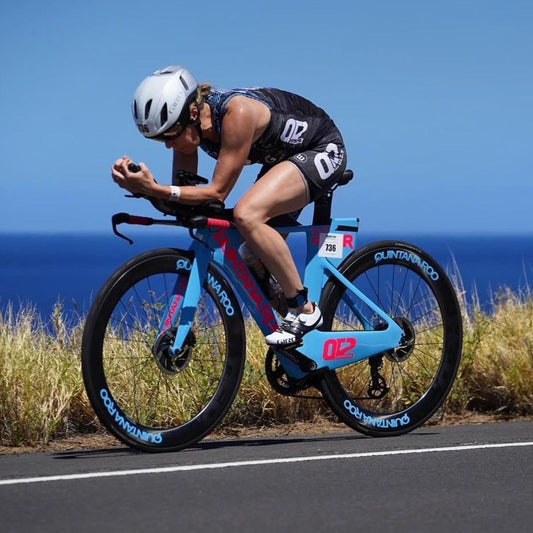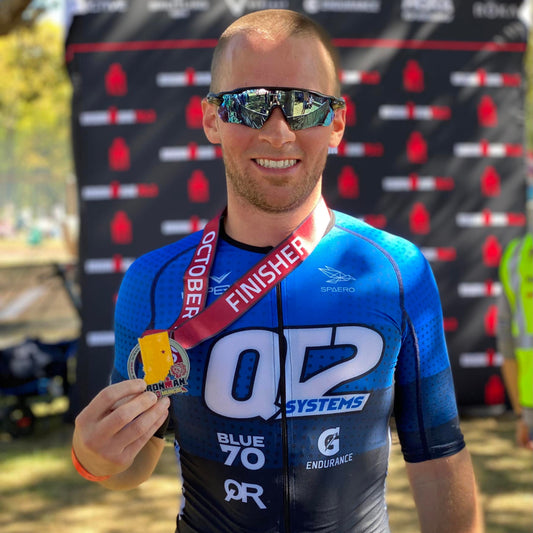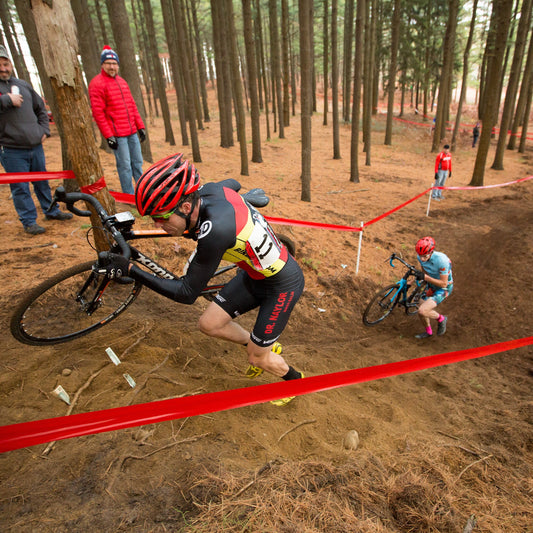The Happy Gremlin
If proper attention is paid to training, nutrition/restoration, race fueling, and race pacing, then we will just naturally race to our potential, right? At QT2 Systems, we consider these four cornerstones of success to be the foundation of race day performance. But, it is often the case that we fall short of our own expectations, despite tremendous fitness. When this occurs, we must consider all aspects of our preparations/execution, including not only these four cornerstones, but perhaps something even deeper still. This adds a layer of complexity to the performance package, as the additional cornerstone is certainly the most complicated, yet. This fifth element, mental fitness, is the least tangible of the cornerstones, and therefore the most difficult to wrap our minds around. The original four cornerstones all have basis in the hard science of human physiology which, though always being refined, is universally well-understood. The introduction of mental fitness brings with it a level of abstraction, because it deals with the human mind, and despite tremendous gains over the last century, its scientific ramifications have not yet been fully defined. So, what is required of this fifth cornerstone? And, perhaps more importantly, what role does it play in creating the world's best athletes?
Elite endurance athletes have an inner drive that allows them to, not only, get up every day and put their bodies through the extreme punishment of training, but also to fight beyond what may be healthy on race day. More often than not these same elites, will typically possess an inner demon that was developed during their upbringing, that serves as the unrelenting spring of motivational drive. Be it a single parent upbringing, abusive parent(s), poverty, drugs and alcohol, or a harmless perception that exists only in the mind of the athlete, this inner demon is a powerful force that can be the separating factor between two athletes of similar physical abilities. This demon, an inner Gremlin of sorts, is a concept I first discussed with elite running coach Bobby McGee. Having observed in his own athletes, as I had in mine, there was something larger than the prize, itself, that allowed these athletes to reach deep down into places within, where most dared not go; some intrinsic motivation that propelled them beyond their peers, or even their own assumed abilities. In none does this appear to ring more true than in our Elite/Professional athletes. When speaking on this topic, it is pretty typical to see a room full of endurance junkies, self-reflecting and taking stock of their own Gremlin, as you may be now. I have recently come to realize that this is the very same Gremlin who provides the basis of an athlete's mental fitness. At a deep level, it defines why they do what they do, and has perhaps, the largest influence on their current mental state.
Athlete potential really boils down to a function of three primary components, 1) physical talent and its development, 2) the existence and degree of the above-mentioned Gremlin, and 3) the current state of mental fitness. These are the building blocks of the elite athlete, and must be considered well-before even discussing training techniques, race fueling, nutrition or any of the other surface level preparation concepts. These three key components to potential all work with one another to directly vary with athlete performance. As a result, an athlete who possesses tremendous physical talent, be it lab tested or evidenced through race results, is likely to have very limited performances, if lacking one of the other two key primary components. Over the years I have met dozens of world-class physical specimens who either lack the Gremlin, and therefore fail to push themselves to the brink, and/or possess an unrefined current state of mental fitness, and blow it on race day.
Here in the United States where the living is easy, relative to the rest of the world, there is a myriad of physical talent, but maybe a significant lack of Gremlin development. This is where it can be pretty easy for my message to get misconstrued. It is a great thing that our children are able to live in the way that they do. I will do everything in my power to make sure that my own children are able to avoid developing any Gremlins, whatsoever. But, the truth of the matter is that our next batch of world champions is likely going to be bred from a pool of Gremlins. At the national level this lack of Gremlin makes it difficult to develop/implement a proper pipeline of elite endurance athletes. Closer to home, the elite coach's challenge is to implant Gremlin-like qualities in those talented athletes who lack it, without suffering the negative consequences. As an example, consider the difference between the United States, and the world's most prolific producer of marathoners, Kenya. In 30 years, the United States has produced fewer than 10 sub-2:10 marathoners. Since just October of 2011, Kenya has produced upwards of 40. How can a country whose population is only an eighth of the United States', produce such a superior pool of athletes? Surely, Kenya has adopted a nationwide 26.2 initiative. But, is that enough to explain this level of dominance? Or, could it be a function of the Gremlins created when the average Kenyan survives on less than $5 a day, approximately 27 times less than the average American? I'll let you decide.
Please don't get me wrong! A good Gremlin does not a champion make. The Gremlin can often serve as the very limiting factor of an athlete. This same Gremlin who drives the athlete's work ethic beyond what is seemingly manageable, can also significantly hinder an athlete's mental fitness. While the Gremlin can create an intrinsic motivation to excel, it can also be the cause of a crippling lack of confidence and feelings of inadequacy.
Mental Fitness - Required
Competition in and of itself is quite a daunting proposition! In it, you avail yourself to comparisons against others, within a confined set of rules. Your abilities, be they strong or weak, are put forth for judgement. This can be a tremendous undertaking for the human ego! How an athlete perceives the environment of the competition, and how it makes them feel is fundamental to mental fitness. Those with strong mental fitness can adapt to any setting, and either take full advantage of it or, at the very least, be completely unaffected by it. In essence, during competition the key components of mental fitness really boil down to the following:
- Failure - Very little fear of it
- Goals - Not thinking about performance outcomes
- Focus - Being "in the moment" and focused on the activity at hand
- Experience - Having your body complete the task almost involuntarily
- Control - Sticking to your executables and staying within your targets, creating great sense of personal control
Types of Athletes - MAF and MAS
Though no athlete is all of either one of these, 99% of athletes can be generally classified into two very differing categories separated by the source of their motivation, those avoiding failure (MAF), and those striving for success (MAS). Each reacts to outside stimuli in very different ways.
MAF athletes will typically perform best in events that are perceived to be either very, very easy or very, very hard. These athletes will thrive at local sprint races, where the competition is appears to be very weak, or in a race like Kona, where they identify the competition to be head and shoulders above themselves. But, at a regional championship, or satellite Ironman, where the perception of success is 50/50, they will talk themselves right out of a potential Kona slot. They tend to become overly aroused, very easily, and begin to focus on task irrelevant items. This state of mental fitness can be very difficult to manage, alongside a gifted physiological system and the Gremlin. The MAF athlete can be unfavorably affected by too much detail in their training and racing, constantly fearing the possibility of failure. As a result, despite superior physical prowess and the Gremlin's motivations, the athlete's true potential is never able to shine through. Many times it's the very Gremlin that provides the intrinsic motivations that makes the athlete a type MAF.
As a coach, how do we combat this mindset, to allow for the athlete's mental fitness to catch up to the athlete's physical gifts and intrinsic motivations? As an extremely detail-focused coach, MAF athletes certainly require a great deal of caution, for me. Too much detail can lead these athletes to believe that inconsequential items can have tremendous race day impacts. For example, we typically assign the exact timing and portion size of a race morning breakfast, based upon the race's distance. MAF athletes may overreact to missing the timing of their breakfast by 10 or 15 minutes, by perceiving this mistake to mean that that they have little, to no, chance of performing in a competitive way. If a particular level of detail is going to create the perception of potential failure, then it is simply not worth it. This begs the question: why focus on SO much detail, if it undermines the athlete on race day? Why not take a more qualitative approach to their preparations and race day execution? As the athlete's mental fitness develops, then more and more detail can be introduced into the fray. Remember, it doesn't matter what the reality actually is, as it is much more about how the athlete will perceive the situation.
On the completely opposite end of the spectrum we have the MAS athlete, who performs very well when they perceive success to be 50/50. They "want the ball", when the game is on the line and are able to rise to the challenge, whatever it may be. Regardless of the reality, if these athletes perceive a challenge, they embrace it. When faced with a 50/50, the MAS athlete can summon the optimal arousal level, leaving them focused and motivated to perform as their fitness suggests. The MAS athlete responds very well to detail, and tends not to perceive "failure" as detrimental. Rather, they maintain perspective of the details, in relation to their training as a whole, better perceiving the reality of each. The MAS athlete is fully equipped to exploit the full summation of its key components; physiological prowess, the Gremlin's intrinsic motivations, and strong current mental fitness. This is the recipe of a champion. The coach's role is to manage all three components, to ensure that they are fully maximized on race day.
We too often draw the conclusion that those who are consistently at the top of our sport are there due to their physical talents and preparations. While this is most likely the case, a deeper look at the forensics of their preparations and performances, often unveils both strong mental fitness and an active inner Gremlin. These two attributes allow the athlete the mental atmosphere and provisions to fully push their physical limiters. The Gremlin provides the training motivation to gain fitness, and then the current state of mental fitness couples with it to provide race day "fight". The current state of mental fitness also helps provide day to day confidence (the "Happy"). This is the basis behind the idea of the "Happy Gremlin". These three components, alone, provide some impact on race day performance. But, working together, and all in sync, current mental fitness, the Gremlin, and physical prowess can become quite the force to be reckoned with.
-Jesse





